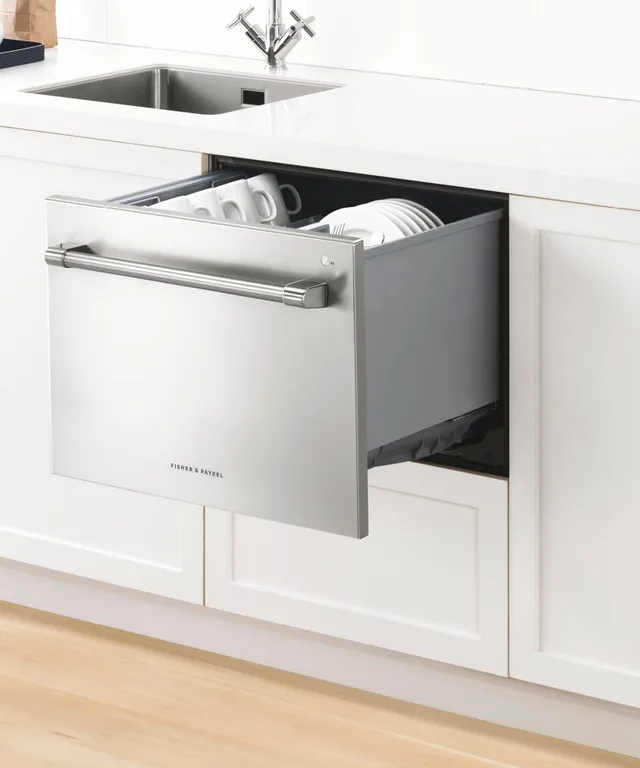Are you stuck trying to decide between a dish drawer and a traditional dishwasher for your kitchen? You’re not alone.
The choice can feel overwhelming, and making the right decision is crucial for both convenience and functionality. Imagine saving time, energy, and hassle while keeping your kitchen looking sleek and modern. Sounds perfect, right? But how do you get there?
Understanding the key differences and benefits of each option is your first step. Dive into this article to discover which appliance aligns with your lifestyle, ensuring you make an informed choice that will enhance your daily routine. Stay with us as we unravel the mystery behind dish drawers and dishwashers, and help you find the perfect fit for your home.
Dish Drawer Basics
When shopping for kitchen appliances, the dish drawer stands out. It’s modern, compact, and offers unique features. Understanding the basics of a dish drawer helps make informed choices.
Design And Functionality
A dish drawer has a sleek design. It fits comfortably under counters. It resembles a large kitchen drawer. This design allows easy loading and unloading. The drawer opens smoothly, offering convenience. Its compact size suits smaller kitchens.
The functionality is straightforward. Users can wash smaller loads quickly. It uses less water than traditional dishwashers. The dish drawer is energy-efficient. It operates quietly, minimizing noise.
Pros And Cons
Pros are clear. The dish drawer saves space. It’s perfect for small kitchens. It offers efficient washing cycles. Less water and energy are used. Users can run smaller loads.
Cons also exist. The capacity is limited. Large families might struggle. It may not fit bigger dishes. The initial cost is higher than a standard dishwasher.
Traditional Dishwasher Features
When it comes to choosing a kitchen appliance that makes your life easier, the traditional dishwasher is a household staple. It’s known for its reliability and efficiency in cleaning dishes without you having to lift a finger. But what makes these machines tick? Let’s dive into the key features that traditional dishwashers offer.
Performance And Capacity
Traditional dishwashers are designed to handle a large volume of dishes in one go. Picture your last big family dinner. With a traditional dishwasher, you can load everything from plates to pots and pans. They come with multiple racks and adjustable settings, allowing you to optimize space.
These dishwashers often boast powerful cleaning capabilities, using jets of water to scrub away tough stains. You might have noticed that even stubborn spaghetti sauce doesn’t stand a chance. This robust performance ensures your dishes come out sparkling clean.
Advantages And Disadvantages
Traditional dishwashers have several advantages. They save time and reduce your water usage compared to hand washing. This is not just a convenience but a sustainable choice. Plus, they often have more cycle options, like heavy-duty or eco mode, to suit your needs.
However, they do have their downsides. Their large size can be a problem in smaller kitchens. You might have to sacrifice some cabinet space to accommodate one. They can also be noisy, disrupting the peaceful flow of your kitchen activities.
So, does the power and capacity of a traditional dishwasher outweigh its space and noise drawbacks for you? Consider your kitchen layout and lifestyle. What matters most in your daily routine?
Space And Installation Considerations
Choosing between a dish drawer and a dishwasher depends on space and installation needs. Dish drawers fit tight spaces and can be installed at various heights. Traditional dishwashers require more room but offer larger capacity.
When choosing between a dish drawer and a traditional dishwasher, space and installation play a critical role. Whether you’re redesigning your kitchen or just upgrading your appliances, understanding how each option fits into your space can make all the difference. You want a solution that not only meets your cleaning needs but also complements your kitchen layout seamlessly.Kitchen Layout Impact
The layout of your kitchen can significantly influence your choice between a dish drawer and a dishwasher. If your kitchen has limited space, a dish drawer might be a better fit. It’s compact and can be installed under the countertop, saving valuable floor space. On the other hand, a traditional dishwasher requires more room but offers a larger capacity. It’s ideal if you have a spacious kitchen and often host gatherings. Think about your kitchen’s workflow. Do you have enough room to move around freely with a larger appliance installed?Installation Requirements
Dish drawers are generally easier to install. They usually require less plumbing and electrical work. This could be a great advantage if you’re looking to minimize renovation costs. Traditional dishwashers might need more complex installation. They often require additional plumbing and electrical adjustments. Consider the potential need for professional installation services, which could add to your budget. For those who enjoy DIY projects, a dish drawer might be an exciting challenge. But if you’re not particularly handy, hiring a professional might be the safer route. When you think about your kitchen’s space and installation needs, which option aligns best with your lifestyle? Are you willing to sacrifice a bit of space for a higher capacity, or does a sleek, space-saving design appeal more to you?Energy Efficiency And Water Usage
Choosing between a dish drawer and a standard dishwasher involves considering energy efficiency and water usage. These factors significantly impact utility bills and environmental sustainability. Understanding the differences can help you make an informed decision.
Comparative Analysis
Dish drawers often use less water per cycle than traditional dishwashers. This makes them ideal for smaller loads. They are designed to handle half the load of a full-sized dishwasher efficiently. Standard dishwashers are better suited for larger families. They clean more dishes but may use more water per cycle.
Energy consumption varies between the two. Dish drawers can be energy efficient, running on smaller loads. This reduces electricity usage. Traditional dishwashers might consume more energy due to larger cycles. Comparing these appliances reveals important differences in their operational costs.
Environmental Impact
Dish drawers have a smaller carbon footprint. Lower water usage means less strain on resources. This makes them eco-friendly options. Standard dishwashers can impact the environment more. They use more water and energy, contributing to higher emissions.
Choosing energy-efficient appliances helps reduce environmental impact. Dish drawers offer a sustainable choice for eco-conscious buyers. Regular maintenance also plays a role. It ensures both types of appliances operate at peak efficiency. Making smart choices can help protect the planet.
Cost Comparison
Comparing costs between dish drawers and dishwashers can help you make an informed choice. Dish drawers often have a higher upfront price but may save energy costs over time. Traditional dishwashers usually offer larger capacity, potentially reducing the frequency of use.
When you’re deciding between a dish drawer and a traditional dishwasher, understanding the cost implications can significantly influence your choice. While both options promise cleaner dishes, they come with different price tags. Let’s break down the costs to help you make the best decision for your home and wallet.Initial Investment
The upfront cost can be a deciding factor. Traditional dishwashers typically range from $500 to $1,500, depending on the brand and features. Dish drawers, however, often start around $700 and can go up to $2,000. Why the higher price for dish drawers? They offer more flexibility with their drawer-based design, allowing you to wash smaller loads more efficiently. However, if your budget is tight, a standard dishwasher might be a more suitable choice initially.Long-term Maintenance
Over time, maintenance costs can add up. Dishwashers are generally known for their durability, but repairs can still range from $100 to $300 for common issues. Dish drawers, being more complex, might incur higher repair costs, often starting at $150. Consider how often you use your appliance. If you’re running it daily, factor in potential wear and tear. Regular maintenance can extend the lifespan of both options, but the complexity of dish drawers might require more frequent check-ups. So, which one fits your budget better? Is it worth spending more now to potentially save later? Balancing the initial costs with long-term maintenance can lead you to the right choice for your kitchen.
Credit: www.eastcoastappliance.com
User Experience
Choosing between a dish drawer and a traditional dishwasher can be challenging. Both offer unique user experiences that cater to different needs. Understanding these differences helps in making a choice that suits your lifestyle. Let’s explore how ease of use and cleaning effectiveness impact your decision.
Ease Of Use
Dish drawers are compact. They fit into small spaces easily. Loading dishes is simple due to their height. Elderly individuals or those with mobility issues find them convenient. Traditional dishwashers require bending. They have larger capacities. This is ideal for bigger households. But they may be less accessible.
Cleaning Effectiveness
Dish drawers clean small loads efficiently. They focus on targeted cleaning. This saves water and energy. Traditional dishwashers excel in cleaning larger loads. They handle bigger utensils well. Some models have advanced cleaning cycles. These ensure thorough cleanliness. Both options offer powerful cleaning, but differ in efficiency.
Choosing Based On Lifestyle
Selecting between a dish drawer and a dishwasher depends largely on lifestyle choices. Dish drawers fit well in compact spaces and are ideal for small loads. Dishwashers suit families, handling larger volumes effortlessly and offering diverse cleaning cycles.
When it comes to choosing between a dish drawer and a traditional dishwasher, your lifestyle plays a significant role. How you live, eat, and entertain should guide your decision. Let’s explore some crucial factors to help you decide which is better suited for your home.Family Size Considerations
If you have a large family, a traditional dishwasher might be more suitable. It handles more dishes in one cycle, saving time and energy. Imagine hosting a family dinner and having to run multiple cycles with a dish drawer. On the other hand, if your household is small or you live alone, a dish drawer could be just the right fit. It prevents wasted water and energy from running a half-empty dishwasher. You can run a smaller load more frequently without guilt.Frequency Of Use
Think about how often you cook or entertain guests. If you frequently host gatherings, a traditional dishwasher might meet your needs better. It’s designed to accommodate larger loads, making after-party clean-ups more manageable. However, if you find yourself washing just a few dishes daily, a dish drawer offers convenience. It allows for quick, efficient cleaning without waiting for a full load. This can be a game-changer for those who prefer a tidy kitchen with minimal effort. Ultimately, your lifestyle dictates which appliance will seamlessly integrate into your routine. Consider how each option aligns with your daily habits and future plans. Which appliance will bring ease and efficiency to your kitchen?
Credit: www.remodelista.com

Credit: www.dewaardandbode.com
Frequently Asked Questions
What Is The Difference Between A Dish Drawer And A Dishwasher?
A dish drawer is a compact, drawer-like unit. A dishwasher is a traditional, larger appliance.
How Much Space Does A Dish Drawer Save?
Dish drawers fit into smaller spaces. They are ideal for compact kitchens or limited spaces.
Are Dish Drawers Energy Efficient?
Yes, dish drawers use less energy and water. They are suitable for smaller loads.
Can Dish Drawers Handle Large Dishes?
Dish drawers have limited space. Larger dishes may need a traditional dishwasher.
Is A Dish Drawer Easier To Load Than A Dishwasher?
Yes, dish drawers are at waist height. Easier access makes loading simple and convenient.
Conclusion
Choosing between a dish drawer and a dishwasher depends on your needs. Dish drawers save space and fit small kitchens. Perfect for light loads. Dishwashers handle large loads and tough stains. Ideal for big families. Consider your kitchen space, lifestyle, and budget.
Both options offer convenience and efficiency. Easy cleanup makes life simpler. Think about your daily dishwashing habits. Evaluate what works best for you. Remember, the right choice keeps your kitchen running smoothly. Happy cleaning and enjoy your spotless dishes!





